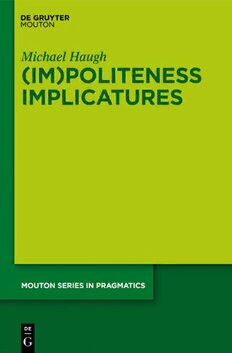Table Of ContentMichael Haugh
Im/Politeness Implicatures
Mouton Series in Pragmatics
Editor
Istvan Kecskes
Editorial Board
Reinhard Blutner (Universiteit von Amsterdam)
N.J. Enfield (Max-Planck-Institute for Psycholinguistics)
Raymond W. Gibbs (University of California, Santa Cruz)
Laurence R. Horn (Yale University)
Boaz Keysar (University of Chicago)
Ferenc Kiefer (Hungarian Academy of Sciences)
Liuis Payrató (University of Barcelona)
François Recanati (Institut Jean-Nicod)
John Searle (University of California, Berkeley)
Deirdre Wilson (University College London)
Volume 11
Michael Haugh
Im/Politeness
Implicatures
ISBN 978-3-11-024006-1
e-ISBN (PDF) 978-3-11-024007-8
e-ISBN (EPUB) 978-3-11-039466-5
ISSN 1864-6409
Library of Congress Cataloging-in-Publication Data
A CIP catalog record for this book has been applied for at the Library of Congress.
Bibliographic information published by the Deutsche Nationalbibliothek
The Deutsche Nationalbibliothek lists this publication in the Deutsche Nationalbibliografie;
detailed bibliographic data are available on the internet at http://dnb.dnb.de.
© 2015 Walter de Gruyter GmbH, Berlin/Munich/Boston
Typesetting: PTP-Berlin Protago-TEX-Production GmbH, Berlin
Printing and binding: CPI books GmbH, Leck
♾ Printed on acid-free paper
Printed in Germany
www.degruyter.com
Contents
List of tables and figures | viii
Transcription conventions | ix
Morphological gloss conventions | x
Preface | xi
Introduction | 1
1 I m/politeness implicatures | 1
2 Overview of the volume | 7
Chapter One:
Indirectness and im/politeness | 13
1 Politeness and indirectness | 13
2 Interpersonal functions of indirectness | 17
3 Analysing indirectness | 20
3.1 Indirectness as pragmatic mismatch | 21
3.2 Indirectness as mitigation | 30
3.3 Indirectness as social action | 33
3.4 Indirectness as culturally imbued practice | 34
4 From indirectness to implicature | 38
Chapter Two:
Approaches to implicature | 41
1 Gricean and neo-Gricean approaches to implicature | 42
1.1 Conversational implicatures and normativity | 43
1.2 Types of Gricean implicature | 47
1.2.1 Conventional implicature | 48
1.2.2 Conversational implicature | 52
1.2.3 Non-conventional, non-conversational implicature | 60
1.2.4 Types of neo-Gricean implicature | 62
1.3 Implicatures and cancellability | 63
2 Post-Gricean approaches to implicature | 69
2.1 Implicature and defaults | 69
2.2 Implicature in Relevance theory | 73
2.2.1 Implicatures as implicitly communicated assumptions | 74
2.2.2 On differentiating implicatures from explicatures | 78
vi Contents
Chapter Three:
Implicature, social action and indeterminacy | 86
1 Implicature and interaction | 86
2 Implicature and social action | 89
2.1 Implicature and indirect speech acts | 90
2.2 Implicature and intentions | 95
2.3 Implicature as social action | 98
2.4 Implicature and action ascription | 107
3 Implicature and meaning-actions | 111
4 Implicature and indeterminacy | 122
4.1 Types of indeterminacy | 125
4.2 Indeterminacy and accountability | 136
Chapter Four:
Implicature, im/politeness and social practice | 142
1 Implicature, relationality and (im)propriety | 143
2 Politeness as implicature | 149
3 Im/politeness as attitudinal evaluation | 158
4 Im/politeness and social practice | 171
4.1 Im/politeness and the moral order | 172
4.2 Im/politeness and the participation order | 179
Chapter Five:
Situating im/politeness implicatures in interaction | 189
1 Im/politeness implicatures as social practice | 190
1.1 Im/politeness as occasioned by implicatures | 191
1.2 Implicatures as constitutive of im/politeness | 202
1.3 Implicatures as occasioned by im/politeness | 210
2 Im/politeness implicatures and the temporal-sequential
order | 215
2.1 Temporality: adjacency, incrementality and emergence | 216
2.2 Sequential position and accountability | 224
3 Im/politeness implicatures and the socio-inferential order | 229
3.1 Default im/politeness implicatures | 230
3.2 Nonce im/politeness implicatures | 233
4 The pragmatics of im/politeness implicatures | 237
Contents vii
Chapter Six:
Politeness implicatures and social action | 240
1 Analysing politeness implicatures vis-à-vis social action | 240
2 Attenuating and withholding | 247
3 Pre-empting | 257
4 Soliciting | 262
5 Disattending | 268
6 Doing delicacy | 272
Chapter Seven:
Impoliteness implicatures and offence | 278
1 Implicating negative assessments | 280
2 Registering and sanctioning offence | 286
3 Mock impoliteness implicatures and relationality | 292
4 Disputing implicated offence | 300
Chapter Eight:
Conclusion | 307
1 Im/politeness implicatures, social action and social
practice | 307
2 Theoretical implications | 313
2.1 Implications for theorising implicature | 313
2.2 Implications for theorising im/politeness | 317
3 Towards an interactional pragmatics | 320
References | 323
Index | 353
List of tables and figures
Figure 1: Key interpersonal functions of indirectness | 19
Figure 2: Types of Gricean implicature | 47
Figure 3: Key types of neo-Gricean implicature | 63
Figure 4: The participation order | 181
Figure 5: The post-Aristotelian/Apuleian Square of Opposition | 204
Figure 6: Evaluations of im/politeness in English and the Square of
Opposition | 205
Figure 7: Evaluations of im/politeness in Chinese and the Square of
Opposition | 209
Figure 8: Types of pragmatic inference | 229
Figure 9: Im/politeness implicatures as social practice | 238
Figure 10: The (meta)pragmatics of im/politeness implicatures | 321
Table 1: Key dimensions of the moral order | 310
Transcription conventions
[ ] overlapping speech
(0.5) numbers in brackets indicate pause length
(.) micropause
: elongation of vowel or consonant sound
- word cut-off
. falling or final intonation
? rising intonation
, ‘continuing’ intonation
= latched utterances
underlining contrastive stress or emphasis
CAPS markedly loud
° ° markedly soft
.hh in-breath
hh out-breath/aspiration
↓ ↑ sharp falling/rising intonation
> < talk is compressed or rushed
< > talk is markedly slowed or drawn out
( ) blank space or talk in parentheses indicates uncertainty about
the transcription
(( )) double brackets indicates extra contextual or non-verbal
information
Morphological gloss conventions
Acc accusative
ASP aspect
C counter
Cont contrastive marker
Cop copula
CP complement
Dim diminuative
Imp imperative
M mood marker
Gen genitive
Hon honorification
Imp imperative
Neg negation
Nom nominative
Nomi nominaliser
Past past tense
PL plural
Pol “polite” form
Pot potential
Prog progressive
PRT particle
Q question marker
Quot quotation
Tag tag question marker
Te “te”-form
Top topic marker
Vol volitional
% code-switch

